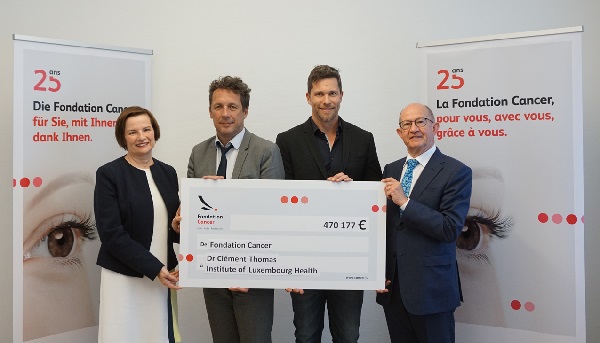 L-R: Lucienne Thommes, Director of Fondation Cancer; Dr. Clément Thomas; Dr. Ulf Nehrbass, Director of the Luxembourg Institute of Health (LIH); Dr. Carlo Bock, President of Fondation Cancer;
Credit: Fondation Cancer
L-R: Lucienne Thommes, Director of Fondation Cancer; Dr. Clément Thomas; Dr. Ulf Nehrbass, Director of the Luxembourg Institute of Health (LIH); Dr. Carlo Bock, President of Fondation Cancer;
Credit: Fondation Cancer
Fondation Cancer has presented a cheque for €470, 177 to Luxembourg Institute of Health (LIH) researcher Clément Thomas (PhD) for the "ACTIMMUNE" project.
The aim of the "Overcoming Tumor Immune Evasion by Targeting the Actin Response" (ACTIMMUNE) project is to evaluate the effectiveness of targeting a novel mechanism by which cancer cells escape the attack of the immune system in different preclinical models and to identify potential therapeutic molecular targets.
For several years, the team Cytoskeleton and Cancer Progression, directed by Clément Thomas, has been interested in the actin cytoskeleton, a very abundant filamentous structure involved in a multitude of cellular functions, such as division, contraction, migration, differentiation, etc. As its name suggests, the actin cytoskeleton also serves as a "skeleton" to the cell and thus defines its morphology. However, unlike the rigid bones of the human body, actin filaments are very dynamic and allow rapid remodeling of the cytoskeleton, and thus the shape of the cell, according to the needs of the latter.
Recently, the LIH team examined the role of the actin cytoskeleton of tumour cells during their attack by cytotoxic lymphocytes whose function is to track down and eliminate diseased cells in the body. Using imaging techniques, the researchers have established that a subpopulation of tumour cells respond to lymphocyte attack by a very rapid remodeling of their cytoskeleton and a massive accumulation of actin filaments at the level of the immunological synapse (zone of interaction between the two types of cells). Indeed, pioneering studies have shown that it is possible to lift tumour cell resistance to cytotoxic lymphocytes by preventing actin shield deployment.
For its part, the ACTIMMUNE project combines two main axes which should make it possible to take an important step towards the clinical application of the recent discoveries made by Clément Thomas's team. The first objective is to develop preclinical experimental models (breast cancer and melanoma in particular) to validate the importance of the actin shield in tumour progression as well as the interest of targeting this process as a therapeutic approach. The second objective of the project is to dissect the signaling pathways involved in the formation of the actin shield and to identify molecular targets with clinical potential. The researchers hope to find action levers that could be activated by drugs to make the actin shield ineffective and thus restore the toxicity of the immune cells.








